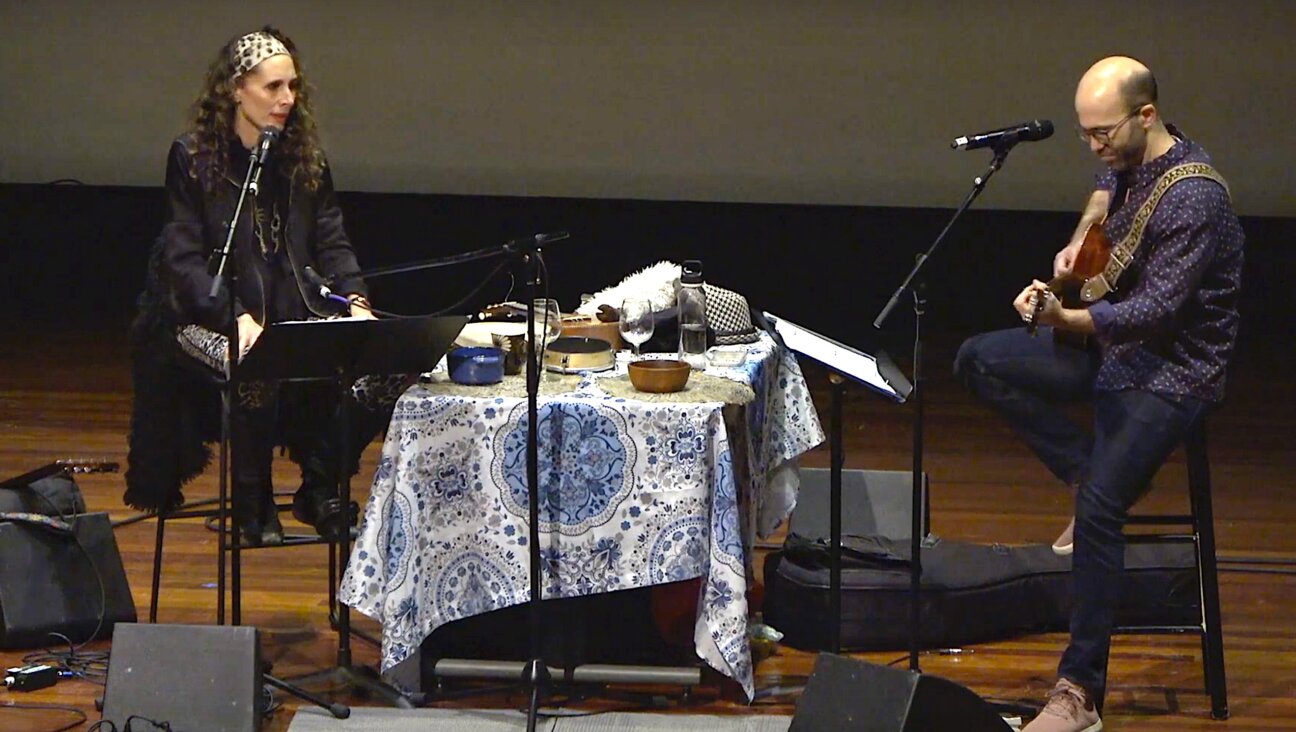The first new full-length American Yiddish drama in decades is set to take the stage
‘The Gospel According to Chaim,’ about a writer who translated the New Testament into Yiddish, will premiere in New York on Dec. 21

The cast of The Gospel According to Chaim from left to right: Mikhl Yashinsky, Melissa Weisz, Sruli Rosenberg and Joshua Horowitz. Photo by Tatiana Stolpovskaya
Yiddish theater in New York is growing in popularity in recent years with remakes of previous Yiddish productions or new translations of classic plays, like the New Yiddish Rep’s “Waiting for Godot,” or the Folksbiene’s production “Fiddler on the Roof in Yiddish” which garnered national attention. But now it’s ready to welcome a brand new play to the stage: The Rep’s “The Gospel According to Chaim” (“Di psure loyt khaim”) is set to be the first original, full-length American Yiddish drama to be produced in seven decades.
The playwright, 33-year-old Mikhl Yashinsky, is a well-known Yiddish actor, having played lead roles in a variety of Yiddish productions; is a popular Yiddish instructor, and co-authored the Yiddish textbook In eynem. Recently, he wrote a short play called “Vos flist durkhn oder” (“Blessing of the New Moon”), which premiered last year at the Lower East Side Play Festival, about a pre-Purim folkloric tradition in a yeshiva that takes a homoerotic turn.
Yashinsky’s new play takes on another iconoclastic historical theme: the story of Chaim Einspruch, a Yiddish writer who found Jesus and translated the New Testament into Yiddish. Einspruch set out to publish his book in Baltimore during the early years of World War II, only to be turned down by every Yiddish printer he approached. Undeterred, he learned the art of printing so that he could publish the New Testament himself in 1941.
The production will be directed by Dmitri Barcomi, founder of the New York pop-up Museum of Drag. The cast will feature Yashinsky himself and Melissa Weisz, who played a role in the Netflix show Unorthodox, while Joshua Horowitz and Sruli Rosenberg will be making their professional theater debuts. Weisz and Rosenberg are both native Yiddish speakers who grew up in Hasidic communities in New York. The New Yiddish Rep prides itself on employing native speakers in their productions.
“Unquestionably beautiful”
The New Testament in Yiddish, despite its understandable lack of popularity among Yiddish speakers, has a history that stretches back centuries. Next week, YIVO will host a lecture about the topic with scholar Naomi Seidman. In her talk, she will discuss the evolution of the Yiddish translation from the original 1540 edition that was largely copied from Martin Luther’s German translation, to Einspruch’s, which is considered by literary critics to be written in masterful Yiddish.
Even the respected Yiddish writer Melekh Ravitch praised it, declaring that “the Einspruch translation of the New Testament is unquestionably beautiful.”
To this day, missionaries will occasionally distribute Einspruch’s translation online or (discreetly) in person in hopes of alluring Yiddish speakers to convert to Christianity/ Messianic Judaism. Messianic Jewish Publishers, a publishing house devoted to the religious movement, lists the publication as its central inspiration on their website:
December 7, 1941. The United States is drawn into World War II. During that same year, Dr. Henry Einspruch publishes his classic book, the Yiddish New Testament, a breakthrough in evangelistic literature for Jewish people. Even as millions die under the reign of Nazi terror, many are made alive through the reading of God’s Word in their mother tongue, Yiddish.
Yashinsky, who encountered Einspruch’s translation at the Yiddish Book Center, found himself more fascinated by the translator himself than the story he translated, calling him “an ardent Yiddishist, devoted to the advancement of Yiddish culture, who also just happened to identify as a Christian.”
“The Gospel According to Chaim” (“Di psure loyt khaim”) will play 21 performances in its world premiere engagement at the Theater for the New City, 155 First Avenue. For more details and to get tickets, click here.
























